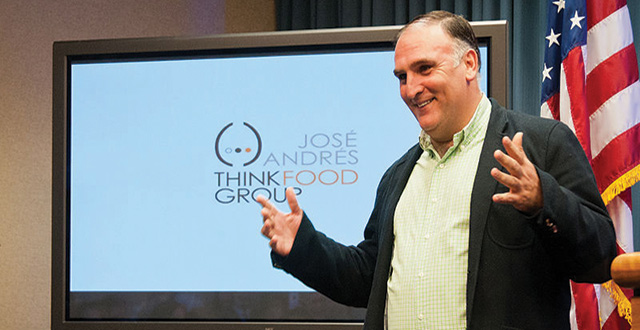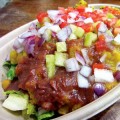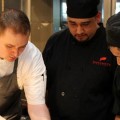Chef Jose Andres began his career gathering firewood. As a young boy in northern Spain, Sunday paella cookouts were a staple. Andres’ task was tending the campfire. One Sunday, he told his father he wouldn’t collect wood unless he could cook. His father refused, but he explained that the best cook is useless without a good fire. This lesson became Andres culinary lodestar, as he told students last Thursday at the International Culinary Center in Campbell.
“Before learning how to cook, be very clear in what your fire is,” he said. “Once you understand what your fire is, you’ll be so powerful that nothing will be able to stop you.”
Indeed, little has been able to stop Andres. He didn’t graduate high school or culinary school, yet he’s the Dean of Spanish Studies at the International Culinary Center, has appeared on Time’s “100 Most Influential” list, and was named Outstanding Chef by the James Beard Foundation. He teaches a “Science and Cooking” course at Harvard and owns restaurants from the avant-garde Minibar, which mixes art with science, to the “fast good” vegetable-centric chain, Beefsteak. Andres vision is what sets him apart from other mogul-chefs. He sees beyond a pretty plate (and his creations are art), to the ripple effects of culinary trends.
“I want to know who believes in local?” he asked to an enthusiastic chorus of yeses. Andres then broke down how buying local is a “threat to national security.” By emphasizing local produce, he said, we cut out other countries’ agricultural jobs. “We have people crossing the desert, trying to come America without a visa because they have nothing,” he said. Buying avocados from Mexico would improve the quality of life in Mexico and reduce the number of undocumented immigrants, he added.
This expansive and critical view of food has taken him beyond the kitchen and to the Dominican Republic, Zambia and Haiti, where his charity, World Central Kitchen, tackles sustainable food enterprises and healthy cooking. For most, “healthy cooking” means substituting olive oil for butter, or brown rice for white. For Andres, it means clean cookstoves.
By WHO calculations, three billion people worldwide still cook with open wood- or coal-burning fires. The smoke from these cookstoves reportedly kills four million people annually, and fuel gathering often falls to young girls, preventing them from attending school. “This year we’re changing—this one I’m very proud—100 schools from charcoal to [liquid petroleum gas],” said Andres, who is an ambassador for the Global Alliance for Clean Cookstoves. Growing up, cooking was “a pleasure and also a necessity,” which has shaped Andres’ pragmatic view of the way we cook, and the way we understand food choices. Now he’s on a mission to ensure that doing good deeds through food is done smart.

 Traverse Homes Offers Comfy Living in the Heart of Milpitas
Traverse Homes Offers Comfy Living in the Heart of Milpitas  Scott's Seafood Revamped its Sixth-Story Patio as a Late-Night Lounge
Scott's Seafood Revamped its Sixth-Story Patio as a Late-Night Lounge 


